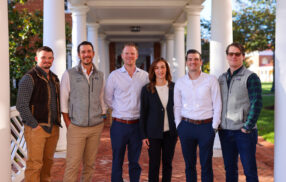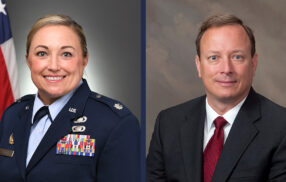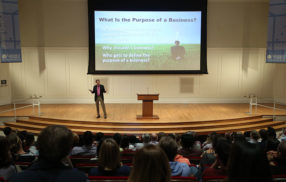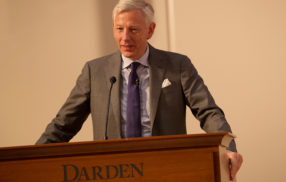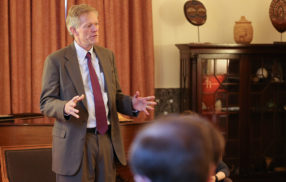
UVA Medical Center CEO Manages Through Health Care Headwinds
By Dave Hendrick
It is a uniquely turbulent time to be a leader in the health care industry.
As the Affordable Care Act ushers in a host of changes to the multi-trillion dollar sector, the foundational reimbursement philosophy of “fee for service” is transitioning to a more complex model, in which health care providers are reimbursed based on performance metrics including clinical outcomes and patient experience, according to University of Virginia Medical Center CEO Pamela Sutton-Wallace, who recently addressed Darden School of Business students as part of the Leadership Speaker Series.
Sutton-Wallace, who has led the UVA Medical Center for almost three years, described the day-to-day complexities involved in running a sprawling academic medical center, where nearly 500 distinct reportable data points are used to measure quality. She said health systems are also being asked to coordinate care with multiple providers — to make contiguous a system that has grown up to be fragmented.
These extensive operational and financial changes come at a time when the commercial insurance market is experiencing significant consolidation, according to Sutton-Wallace. Simultaneously, she said, academic medical centers are also seeing reductions in federal and state reimbursement to care for the uninsured.
“Anyone of these you could probably weather, but taken all together, it’s an extraordinary challenge for health care providers to absorb so many changes at once,” Sutton-Wallace said of the industry’s headwinds.
Despite these challenges, Sutton-Wallace said the UVA Medical Center continues to expand to meet both consumer expectations and market demand, and currently has a $400 million bed tower expansion underway, which is intended to increase the number of private rooms at the hospital.
In addition to expectations of privacy, there are also growing expectations of cost transparency as consumers increasingly pay for more of their health care.
“When you have to pay a larger portion of your medical bill, you start carrying about itemized costs,” Sutton-Wallace said.
As operating costs at academic health systems continue to rise, Sutton-Wallace said UVA increasingly looks to rein in unsustainable costs. As an example, the UVA Medical Center spends almost $150 million on supplies each year and is working with clinicians to standardize supplies and reduce unnecessary supply waste.
UVA is also attempting to harness its wealth of data to enable more preventive measures, with Sutton-Wallace citing the example of the neonatologist who can identify patients at risk for heart complications days before such an event occurs.
With a rapidly changing, endlessly complex backdrop, Sutton-Wallace shared a series of what she described as the “leadership competencies of the future” for health care professionals. Critical competencies include:
- Analytical thinking
- Financial acumen
- Communications skills
- Facilitation of difficult conversation
- Willingness to accept delayed gratification.
“People want to be on a steep career trajectory, but you have to be comfortable with an up-and-down career,” Sutton-Wallace said, noting that her own career at one point included plans for a Ph.D. in political science before a serendipitous meeting led her to a health care job within the health care insurance field.
Asked what areas Darden MBAs could apply their skills most acutely at a place like the UVA Health System, Sutton-Wallace did not hesitate in answering, “process improvement.”
Whether financially or operationally, Sutton-Wallace said there was ample room for innovation and process improvement in a sector where change seems to be the only constant, and remains difficult to operationalize.
The University of Virginia Darden School of Business prepares responsible global leaders through unparalleled transformational learning experiences. Darden’s graduate degree programs (MBA, MSBA and Ph.D.) and Executive Education & Lifelong Learning programs offered by the Darden School Foundation set the stage for a lifetime of career advancement and impact. Darden’s top-ranked faculty, renowned for teaching excellence, inspires and shapes modern business leadership worldwide through research, thought leadership and business publishing. Darden has Grounds in Charlottesville, Virginia, and the Washington, D.C., area and a global community that includes 18,000 alumni in 90 countries. Darden was established in 1955 at the University of Virginia, a top public university founded by Thomas Jefferson in 1819 in Charlottesville, Virginia.
Press Contact
Molly Mitchell
Senior Associate Director, Editorial and Media Relations
Darden School of Business
University of Virginia
MitchellM@darden.virginia.edu



